Unit 2 Morals and Virtues Reading for Writing 课件(共28张,内嵌音视频)2024-2025学年高中英语人教版(2019)必修第三册
文档属性
| 名称 | Unit 2 Morals and Virtues Reading for Writing 课件(共28张,内嵌音视频)2024-2025学年高中英语人教版(2019)必修第三册 | 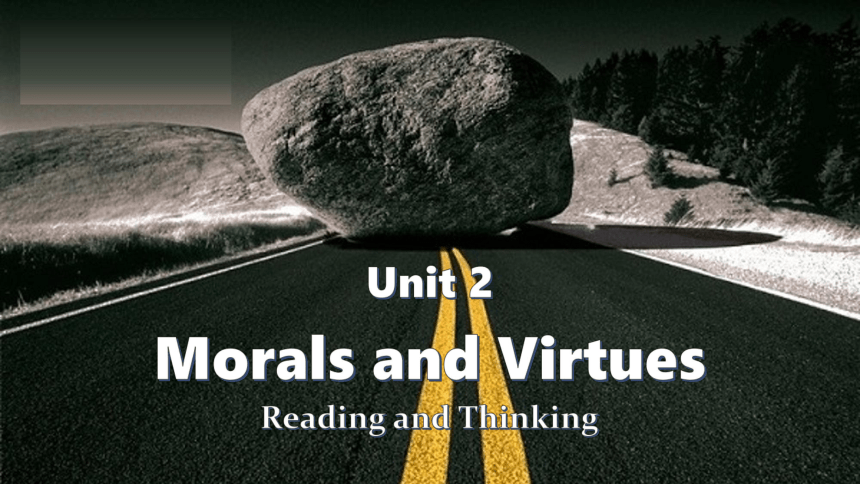 | |
| 格式 | pptx | ||
| 文件大小 | 70.3MB | ||
| 资源类型 | 教案 | ||
| 版本资源 | 人教版(2019) | ||
| 科目 | 英语 | ||
| 更新时间 | 2024-12-23 18:06:46 | ||
图片预览

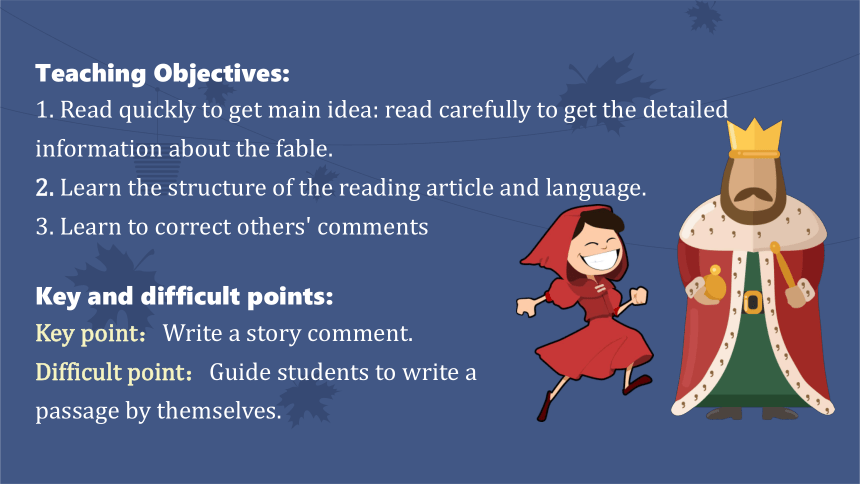
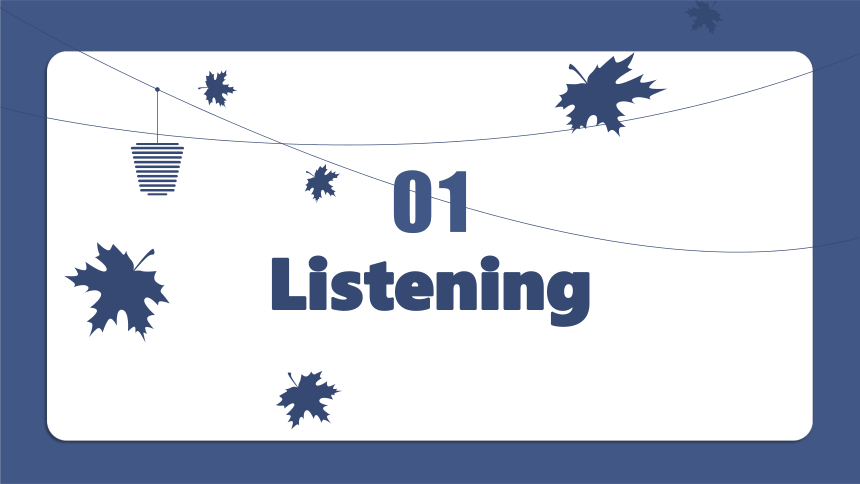
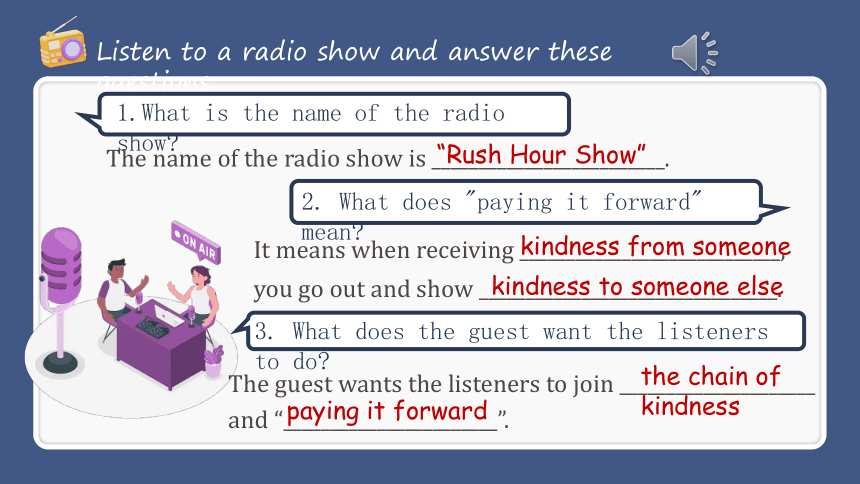
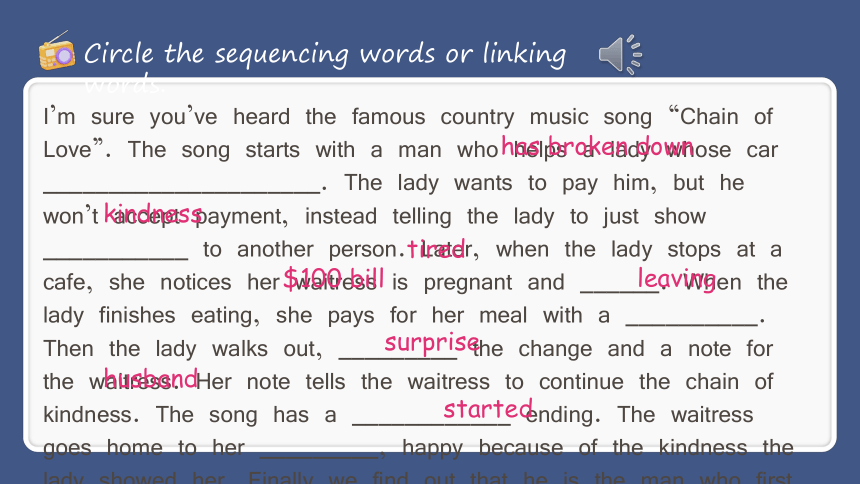
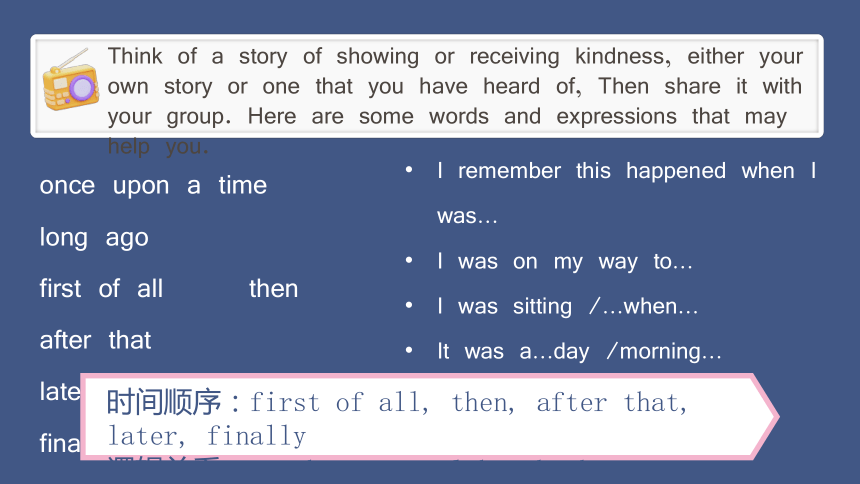
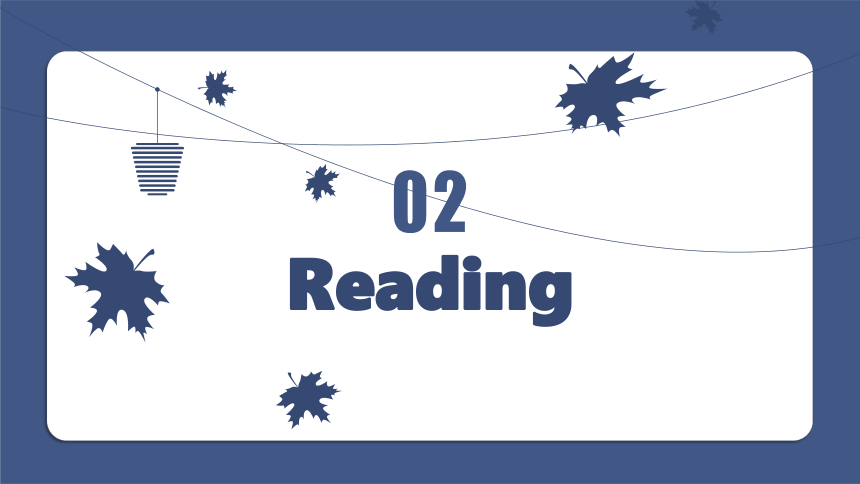
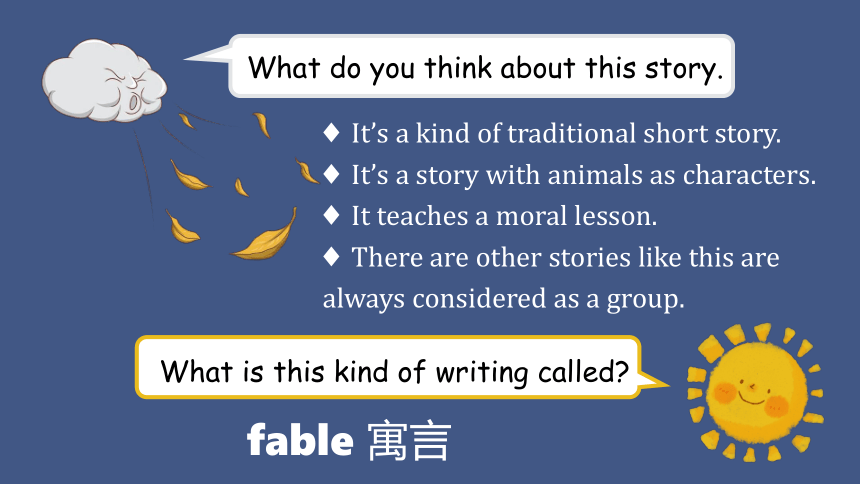
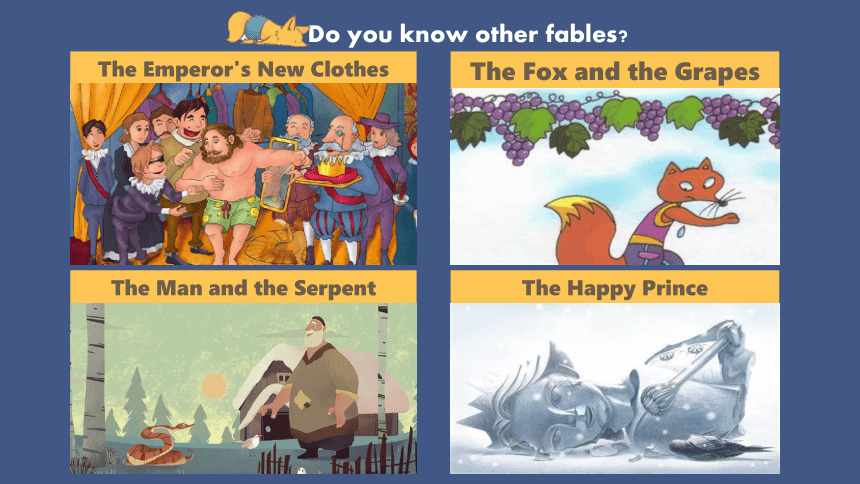
文档简介
(共28张PPT)
Unit 2
Morals and Virtues
Reading and Thinking
Teaching Objectives:
1. Read quickly to get main idea: read carefully to get the detailed
information about the fable.
2. Learn the structure of the reading article and language.
3. Learn to correct others' comments
Key and difficult points:
Key point:Write a story comment.
Difficult point:Guide students to write a passage by themselves.
Listening
01
Listen to a radio show and answer these questions.
1.What is the name of the radio show
The name of the radio show is _________________________.
“Rush Hour Show”
2. What does "paying it forward" mean
It means when receiving ____________________________, you go out and show ________________________________.
kindness from someone
kindness to someone else
3. What does the guest want the listeners to do
The guest wants the listeners to join _____________________ and “_______________________”.
the chain of kindness
paying it forward
Circle the sequencing words or linking words.
I’m sure you’ve heard the famous country music song “Chain of Love”. The song starts with a man who helps a lady whose car _____________________. The lady wants to pay him, but he won’t accept payment, instead telling the lady to just show ___________ to another person. Later, when the lady stops at a cafe, she notices her waitress is pregnant and ______. When the lady finishes eating, she pays for her meal with a __________. Then the lady walks out, _________ the change and a note for the waitress. Her note tells the waitress to continue the chain of kindness. The song has a ____________ ending. The waitress goes home to her _________, happy because of the kindness the lady showed her. Finally we find out that he is the man who first ___________the chain of kindness!
has broken down
kindness
tired
$100 bill
leaving
surprise
husband
started
Think of a story of showing or receiving kindness, either your own story or one that you have heard of, Then share it with your group. Here are some words and expressions that may help you.
I remember this happened when I was…
I was on my way to…
I was sitting /…when…
It was a…day /morning…
There were…on the street …
once upon a time long ago
first of all then after that
later finally so
however although but
时间顺序:first of all, then, after that, later, finally
逻辑关系:so, however, although, but
Reading
02
What do you think about this story.
It’s a kind of traditional short story.
It’s a story with animals as characters.
It teaches a moral lesson.
There are other stories like this are always considered as a group.
What is this kind of writing called
fable 寓言
Do you know other fables
The Emperor's New Clothes
The Fox and the Grapes
The Man and the Serpent
The Happy Prince
Vocabulary
disguise
disguise sb./oneself as 把某人/自己伪装成
disguise the fact that... 掩饰……的事实
in disguise 伪装;乔装
in the disguise of 伪装成,假扮成; 以……为借口
a blessing in disguise 因祸得福
练习:The supposed beggar was really a police officer ___________ disguise.
vt.装扮;假扮;掩盖
n.伪装;化装用具
in
Vocabulary
tear
burst into tears 突然大哭起来
be bathed in tears 泪流满面
tear apart sth./sb. 撕毁;撕碎;使不快;使担心
tear at sth. 撕开;撕裂
tear down 拆除,拆毁(建筑物、墙等)
练习:The supposed beggar was really a police officer ___________ disguise.
n.眼;泪水
v. (tear, tore, torn) 撕破;撕
to
Vocabulary
harm
harmless adj.无害的;无恶意的
be of great harm 危害极大的
do no harm 无害
do more harm than good 弊大于利
mean no harm没有恶意
练习:We don't know how many and what kinds of noises are ___________ (harm) to ocean animals.
n.&vt. 伤害;损害
harmful
Read the fable The Stone in the Road and answer the questions.
1. What was the king's idea for teaching an important lesson to his people
2. What was the response from most of the people
3. What did the young girl think and do when she saw the coins
1. What was the king's idea for teaching an important lesson to his people
He put a huge stone in the middle of a road and hid gold coins under it, and then watched to see if anyone would move it.
2. What was the response from most of the people
Most of the people just got upset that the stone was in their way.
3. What did the young girl think and do when she saw the coins
She thought that the money belonged to someone else and that it should be returned.
This story presented different people’s emotions and responses when they came across the same plete the table according to the story.
Person Experience Emotion Response
milkman crashed into the stone angry went away
women with water
other villiagers
young Girl
tripped over the stone
sad
limped away in tears
complained about
the stone
upset
nobody made an attempt to move the stone out of the road
succeeded in moving the stone to the side of the street
tired,
surprised
wanted to find the owner of the gold
Work in pairs. Discuss the questions.
1. What do you think this fable is trying to tell us
Do you think the king was wise Why or why not
The moral of the story is that we should all take responsibility for our community. I don’t think that the king was very wise, however, because no one learnt anything from his experiment. The milkman, the woman with her water pot, and the other villagers continued on their travels without having changed their attitudes at all. The king did find one responsible
young girl, but she was already a responsible
person before she encountered the stone in
the road.
Work in pairs. Discuss the questions.
2 Can you think of times in your own life when you felt and acted like the girl or like the other people in the story Give examples.
There have been times when I have acted responsibly like the girl in the story. For example, I recently saw some children playing on a dangerous balcony, and so I warned them it was dangerous and had them go somewhere else to play. However, often
I'm more like the milkman in the story
because I'm very busy with my own
work and worries.
Writing
03
How to write a story.
阅读下面短文,根据所给情节进行续写,使之构成一个完整的故事。
Once, when I was a teenager, my father and I were standing in line to buy tickets for the circus. Finally, there was only one family between us and the ticket counter.
This family made a big impression on me. There were eight children, all probably under the age of twelve. You could tell they didn't have a lot of money.
Their clothes were not expensive. but they were clean. The children were well-behaved. all of them standing in line two-by-two behind their parents, holding hands. They were excitedly talking about the clowns, elephants, and other acts they would see that night with their brothers or sisters in a low voice.
One could sense they had never been to the circus before. It promised to be highlight of their young lives. The father and mother were at the head of the pack, standing proud as could be. The mother was holding her husband's hand, looking up at him as if to say, “You are my knight in shining armor."
Paragraph 1:
Seeing what was going on, __________________________________________________
__________________________________________________________________________________________________________________________________________________________________________________________________________________________________________
Paragraph 2:
That day my father and I went back to our car and drove home without any tickets. ______________________________________________________________________
__________________________________________________________________________________________________________________________________________________________________________________________________________________________________________
How to write a story.
Step 1: How to read
阅读首段,理解故事背景
在文本的开头部分,作者通常会交待故事发展的背景。在本文中,通过阅读首段,我们可知故事发生时间when I was a teenager;故事人物my father and I ,one family;故事发生地点in line to buy tickets for the circus。
Step 1: How to read
解读文本,理解故事发展
了解了故事发生的背景后,细读文本,理解故事发展,所给文本可分为3部分。
Part 1 (Para.1):交代时间,人物,地点。
Part 2 (Para.2-3) :“我”和父亲注意到前面的家庭,描绘出一个关系紧密,虽贫穷,仍尽力维持自尊与体面的家庭形象。
Part 3 (Para.4) :这个家庭多么期待与自豪去观赏马戏表演。
Part 4 (Para.5-9) :买票时,这个家庭里的父亲却发现他们没有足够的钱买票。“我”为此替他们难过。
Step 2: Find the clues
解读所给首句,合理预测情节
根据Para. 1 Seeing what was going on,可推断出“我”和父亲全程旁观了这个家庭的期待与窘迫,文本最后Actually we were not wealthy in any sense. So I understand how the kids would feel. I felt sorry for them.表明“我”的家庭也并不富裕,所以很能共情孩子们期待落空的难过。结合Para. 2 That day my father and I went back to our car and drove home without any tickets.可推测出在第一段中“我”和父亲决定拿出自己买票的钱帮助这家人,根据这段线索构思第一段情节。此时可以延伸一下父亲如何征求“我”的同意,又用什么方法帮助了这家人。
Step 2: Find the clues
解读所给首句,合理预测情节
Para. 2 That day my father and I went back to our car and drove home without any tickets.作者看到父亲将自己的票钱给了别人,肯定有很多疑惑。此处故事已走向结局,所以无需增加更多情节,可以通过“我”与父亲的对话着重描写“我”的感悟。
Sample
Paragraph 1:
Seeing what was going on, my dad put his hand in his pocket, pulled out a $20 bill and dropped it on the ground. Then he picked it up and tapped the man on the shoulder and said, "Excuse me, sir, this fell out of your pocket." The man turned around and saw the money. He knew what was going on , he looked straight into my dad's eyes. took my dad's hand in both of his, squeezed tightly onto the $20 bill, and with his lip shaking and a tear running down his cheek, he replied, “Thank you, thank you, sir. This really means a lot to me and my family.
掏出
掉到
轻拍
紧紧捏住
Sample
Paragraph 2:
That day my father and I went back to our car and drove home without any tickets. We didn't go to the circus that night when I asked dad why he did so, Dad said, “My child, it was a desperate, heartbreaking and embarrassing situation for a father. Surely he wasn't begging for a handout, but he reminded me of my father, when I was young." He paused for a while as if wandering in his memory. "We should appreciate what we have obtained from life and seize every opportunity to help others We didn't go to the circus tonight, but we didn't go without. Now, who wants an ice cream "
n. 马戏团;马戏
adj. 绝望的
adj. 令人尴尬的
n.施舍
抓住每个机会
SEE YOU NEXT TIME
Unit 2
Morals and Virtues
Reading and Thinking
Teaching Objectives:
1. Read quickly to get main idea: read carefully to get the detailed
information about the fable.
2. Learn the structure of the reading article and language.
3. Learn to correct others' comments
Key and difficult points:
Key point:Write a story comment.
Difficult point:Guide students to write a passage by themselves.
Listening
01
Listen to a radio show and answer these questions.
1.What is the name of the radio show
The name of the radio show is _________________________.
“Rush Hour Show”
2. What does "paying it forward" mean
It means when receiving ____________________________, you go out and show ________________________________.
kindness from someone
kindness to someone else
3. What does the guest want the listeners to do
The guest wants the listeners to join _____________________ and “_______________________”.
the chain of kindness
paying it forward
Circle the sequencing words or linking words.
I’m sure you’ve heard the famous country music song “Chain of Love”. The song starts with a man who helps a lady whose car _____________________. The lady wants to pay him, but he won’t accept payment, instead telling the lady to just show ___________ to another person. Later, when the lady stops at a cafe, she notices her waitress is pregnant and ______. When the lady finishes eating, she pays for her meal with a __________. Then the lady walks out, _________ the change and a note for the waitress. Her note tells the waitress to continue the chain of kindness. The song has a ____________ ending. The waitress goes home to her _________, happy because of the kindness the lady showed her. Finally we find out that he is the man who first ___________the chain of kindness!
has broken down
kindness
tired
$100 bill
leaving
surprise
husband
started
Think of a story of showing or receiving kindness, either your own story or one that you have heard of, Then share it with your group. Here are some words and expressions that may help you.
I remember this happened when I was…
I was on my way to…
I was sitting /…when…
It was a…day /morning…
There were…on the street …
once upon a time long ago
first of all then after that
later finally so
however although but
时间顺序:first of all, then, after that, later, finally
逻辑关系:so, however, although, but
Reading
02
What do you think about this story.
It’s a kind of traditional short story.
It’s a story with animals as characters.
It teaches a moral lesson.
There are other stories like this are always considered as a group.
What is this kind of writing called
fable 寓言
Do you know other fables
The Emperor's New Clothes
The Fox and the Grapes
The Man and the Serpent
The Happy Prince
Vocabulary
disguise
disguise sb./oneself as 把某人/自己伪装成
disguise the fact that... 掩饰……的事实
in disguise 伪装;乔装
in the disguise of 伪装成,假扮成; 以……为借口
a blessing in disguise 因祸得福
练习:The supposed beggar was really a police officer ___________ disguise.
vt.装扮;假扮;掩盖
n.伪装;化装用具
in
Vocabulary
tear
burst into tears 突然大哭起来
be bathed in tears 泪流满面
tear apart sth./sb. 撕毁;撕碎;使不快;使担心
tear at sth. 撕开;撕裂
tear down 拆除,拆毁(建筑物、墙等)
练习:The supposed beggar was really a police officer ___________ disguise.
n.眼;泪水
v. (tear, tore, torn) 撕破;撕
to
Vocabulary
harm
harmless adj.无害的;无恶意的
be of great harm 危害极大的
do no harm 无害
do more harm than good 弊大于利
mean no harm没有恶意
练习:We don't know how many and what kinds of noises are ___________ (harm) to ocean animals.
n.&vt. 伤害;损害
harmful
Read the fable The Stone in the Road and answer the questions.
1. What was the king's idea for teaching an important lesson to his people
2. What was the response from most of the people
3. What did the young girl think and do when she saw the coins
1. What was the king's idea for teaching an important lesson to his people
He put a huge stone in the middle of a road and hid gold coins under it, and then watched to see if anyone would move it.
2. What was the response from most of the people
Most of the people just got upset that the stone was in their way.
3. What did the young girl think and do when she saw the coins
She thought that the money belonged to someone else and that it should be returned.
This story presented different people’s emotions and responses when they came across the same plete the table according to the story.
Person Experience Emotion Response
milkman crashed into the stone angry went away
women with water
other villiagers
young Girl
tripped over the stone
sad
limped away in tears
complained about
the stone
upset
nobody made an attempt to move the stone out of the road
succeeded in moving the stone to the side of the street
tired,
surprised
wanted to find the owner of the gold
Work in pairs. Discuss the questions.
1. What do you think this fable is trying to tell us
Do you think the king was wise Why or why not
The moral of the story is that we should all take responsibility for our community. I don’t think that the king was very wise, however, because no one learnt anything from his experiment. The milkman, the woman with her water pot, and the other villagers continued on their travels without having changed their attitudes at all. The king did find one responsible
young girl, but she was already a responsible
person before she encountered the stone in
the road.
Work in pairs. Discuss the questions.
2 Can you think of times in your own life when you felt and acted like the girl or like the other people in the story Give examples.
There have been times when I have acted responsibly like the girl in the story. For example, I recently saw some children playing on a dangerous balcony, and so I warned them it was dangerous and had them go somewhere else to play. However, often
I'm more like the milkman in the story
because I'm very busy with my own
work and worries.
Writing
03
How to write a story.
阅读下面短文,根据所给情节进行续写,使之构成一个完整的故事。
Once, when I was a teenager, my father and I were standing in line to buy tickets for the circus. Finally, there was only one family between us and the ticket counter.
This family made a big impression on me. There were eight children, all probably under the age of twelve. You could tell they didn't have a lot of money.
Their clothes were not expensive. but they were clean. The children were well-behaved. all of them standing in line two-by-two behind their parents, holding hands. They were excitedly talking about the clowns, elephants, and other acts they would see that night with their brothers or sisters in a low voice.
One could sense they had never been to the circus before. It promised to be highlight of their young lives. The father and mother were at the head of the pack, standing proud as could be. The mother was holding her husband's hand, looking up at him as if to say, “You are my knight in shining armor."
Paragraph 1:
Seeing what was going on, __________________________________________________
__________________________________________________________________________________________________________________________________________________________________________________________________________________________________________
Paragraph 2:
That day my father and I went back to our car and drove home without any tickets. ______________________________________________________________________
__________________________________________________________________________________________________________________________________________________________________________________________________________________________________________
How to write a story.
Step 1: How to read
阅读首段,理解故事背景
在文本的开头部分,作者通常会交待故事发展的背景。在本文中,通过阅读首段,我们可知故事发生时间when I was a teenager;故事人物my father and I ,one family;故事发生地点in line to buy tickets for the circus。
Step 1: How to read
解读文本,理解故事发展
了解了故事发生的背景后,细读文本,理解故事发展,所给文本可分为3部分。
Part 1 (Para.1):交代时间,人物,地点。
Part 2 (Para.2-3) :“我”和父亲注意到前面的家庭,描绘出一个关系紧密,虽贫穷,仍尽力维持自尊与体面的家庭形象。
Part 3 (Para.4) :这个家庭多么期待与自豪去观赏马戏表演。
Part 4 (Para.5-9) :买票时,这个家庭里的父亲却发现他们没有足够的钱买票。“我”为此替他们难过。
Step 2: Find the clues
解读所给首句,合理预测情节
根据Para. 1 Seeing what was going on,可推断出“我”和父亲全程旁观了这个家庭的期待与窘迫,文本最后Actually we were not wealthy in any sense. So I understand how the kids would feel. I felt sorry for them.表明“我”的家庭也并不富裕,所以很能共情孩子们期待落空的难过。结合Para. 2 That day my father and I went back to our car and drove home without any tickets.可推测出在第一段中“我”和父亲决定拿出自己买票的钱帮助这家人,根据这段线索构思第一段情节。此时可以延伸一下父亲如何征求“我”的同意,又用什么方法帮助了这家人。
Step 2: Find the clues
解读所给首句,合理预测情节
Para. 2 That day my father and I went back to our car and drove home without any tickets.作者看到父亲将自己的票钱给了别人,肯定有很多疑惑。此处故事已走向结局,所以无需增加更多情节,可以通过“我”与父亲的对话着重描写“我”的感悟。
Sample
Paragraph 1:
Seeing what was going on, my dad put his hand in his pocket, pulled out a $20 bill and dropped it on the ground. Then he picked it up and tapped the man on the shoulder and said, "Excuse me, sir, this fell out of your pocket." The man turned around and saw the money. He knew what was going on , he looked straight into my dad's eyes. took my dad's hand in both of his, squeezed tightly onto the $20 bill, and with his lip shaking and a tear running down his cheek, he replied, “Thank you, thank you, sir. This really means a lot to me and my family.
掏出
掉到
轻拍
紧紧捏住
Sample
Paragraph 2:
That day my father and I went back to our car and drove home without any tickets. We didn't go to the circus that night when I asked dad why he did so, Dad said, “My child, it was a desperate, heartbreaking and embarrassing situation for a father. Surely he wasn't begging for a handout, but he reminded me of my father, when I was young." He paused for a while as if wandering in his memory. "We should appreciate what we have obtained from life and seize every opportunity to help others We didn't go to the circus tonight, but we didn't go without. Now, who wants an ice cream "
n. 马戏团;马戏
adj. 绝望的
adj. 令人尴尬的
n.施舍
抓住每个机会
SEE YOU NEXT TIME
